
Which PCs and laptops are best for working from home in 2024
- What is the difference between a laptop and a PC?
- 2 recommended laptops for working from home
- 2 recommended desktop for working from home
- Laptops vs. PCs: what’s the best for working from home?
- Are desktops cheaper than laptops?
- Desktop vs. Laptop: which one should you choose for working from home?
- Laptop or desktop computer: what’s the best for working from home?
- Where to buy a laptop or a desktop computer?
This post may contain affiliate links, meaning we may receive a small commission at no cost for you, if you purchase through these links.
If you’re a freelancer working from home or aspiring to become one, you’ve probably faced the dilemma of choosing the best PC or laptop to support your work. This is a common issue, and it can be confusing to determine which computer would be the most suitable for your specific freelancing requirements.
To address this challenge, we’ve put together a guide to help you select the right computer for your freelancing needs. We understand that there isn’t a one-size-fits-all answer to this question since the ideal computer varies depending on individual needs.
We will peovide you with a list of specific laptops or desktop computers, and a checklist of essential factors to consider when deciding which type of machine to purchase.
What is the difference between a laptop and a PC?
When it comes to determining the best PCs and laptops for working from home, it’s important to consider the fundamental differences between desktops and laptops.
Desktop computers are stationary and can only be used in a fixed location, requiring connections to external tools to function properly.
On the other hand, laptops are portable and can be taken with you wherever you go. They don’t need to be connected to external components to work, but they can be connected to additional devices if desired.
2 recommended laptops for working from home
1. Dell XPS 13
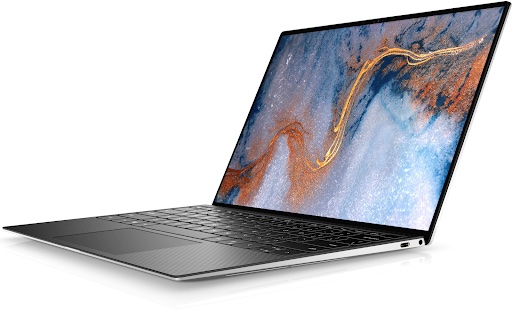
The Dell XPS 13 is a sleek and attractive laptop that can be used for business and personal computing. With its slim design, powerful Intel Core i5 processor, 8 GB of RAM, and 256 GB SSD drive, it packs plenty of power in a small package. The full HD touch-screen display provides crisp visuals with great color accuracy. The battery life is impressive, boasting up to 12 hours of continuous use on a single charge.
The XPS 13 has two USB 3.0 ports connecting external hard drives or peripherals. It also includes two mini DisplayPort 1.2 ports for connecting multiple monitors and a Thunderbolt 3 port for data transfer speeds up to eight times faster than USB 3.0 devices. Additionally, it features 802.11ac Wi-Fi and Bluetooth 4.2, so you can stay connected wirelessly when needed.
The keyboard is comfortable to type on, featuring an efficient layout and backlit keys, making it easy to work in low-light conditions or at night. The precision trackpad is also quite responsive while navigating the operating system with multi-touch gestures or clicking with the integrated mouse buttons located around the perimeter of the trackpad itself.
Overall, the Dell XPS 13 offers great performance in a lightweight and portable design coupled with modern connectivity options like USB-C and Thunderbolt 3, as well as wireless technology such as Wi-Fi AC/Bluetooth 4.2 for staying connected on the go without sacrificing performance when compared to bigger laptops in its price range due to its powerful Intel Core i5 processor and 8 GB of RAM which allows for multitasking without lagging or slowing down during intensive tasks like video editing or graphic design projects. Its long battery life ensures you can get through your day without worrying about running out of juice before reaching your destination. At the same time, its touchscreen display provides great visuals with accurate colors that look crisp even from an angle, making it an excellent choice if you’re looking for something that satisfies both your mobile needs and your work/entertainment needs in one device.
2. MacBook Pro
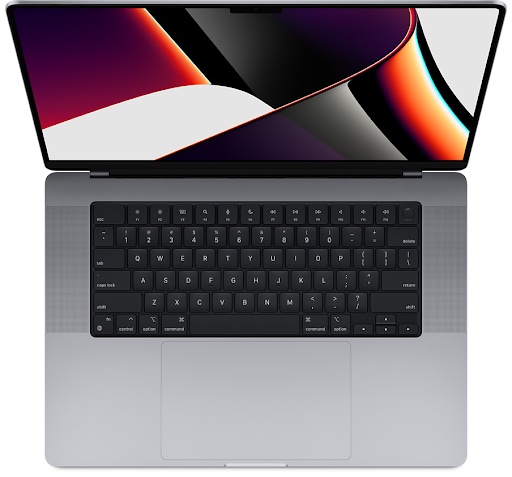
The MacBook Pro is a revolutionary piece of technology from Apple, offering unparalleled power and performance for users who require a laptop that can keep up with their demanding workloads. It features an advanced Intel Core processor, a stunning Retina display, and superb battery life.
The design of the MacBook Pro is sleek and lightweight yet still robust enough to handle various tasks. It has an aluminum unibody design with chamfered edges along the sides, which gives it an elegant look that stands out from other laptops. The Retina display offers detailed and vibrant visuals, while the anti-glare coating makes it easier on the eyes when working in darker environments. The Intel Core processor is incredibly powerful, allowing users to multitask easily, and its 8GB RAM ensures smooth transitions between applications.
The MacBook Pro also comes equipped with an array of ports for connecting peripherals such as external monitors or storage devices. Two Thunderbolt 3 USB-C ports on either side of the laptop provide plenty of connectivity options, including support for up to 10 Gb/s transfer speeds. Additionally, there are four USB 3 Type-A ports located on the left side, as well as two headphone jacks for audio input and output.
In terms of performance, the MacBook Pro does not disappoint in any way. Its advanced Intel Core processor and excellent cooling system help keep temperatures low during intensive tasks such as video editing or gaming. This allows users to get more done without worrying about overheating issues or slowdowns in performance due to heat buildup. Additionally, its 8GB RAM allows users to quickly and efficiently switch between multiple applications. At the same time, its ample storage capacity lets them store more than enough files without sacrificing speed or efficiency. Furthermore, its outstanding battery life ensures you can get through your day without fearing having to charge your device throughout the day.
Overall, if you are looking for a high-performance laptop that combines style and function, then the MacBook Pro is worth considering for your needs. With its impressive hardware specifications and beautiful design, it has everything you need no matter what type of user you are – from college students to professional creatives – making it one of the best laptops currently available on the market today.
2 recommended desktop for working from home
Apple Mac Mini
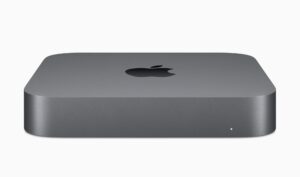
The Apple Mac Mini is a popular choice for working from home for several reasons:
- Portability: The Mac Mini is small and compact, making it easy to take with you wherever you go. It can fit into a backpack or a small bag, making it a great choice for freelancers who need to work on the go.
- Cost-effective: The Mac Mini is one of the most affordable Mac computers available. Freelancers who are just starting out or who don’t need a lot of computing power may find the Mac Mini to be a cost-effective option.
- Powerful: Despite its small size, the Mac Mini is a powerful machine that can handle complex tasks like video editing and graphic design. It’s equipped with an M1 chip, which provides impressive processing power and speed.
- Customizable: The Mac Mini can be customized to suit a freelancer’s specific needs. You can add more RAM, storage, and other features to make it more powerful and efficient.
- Easy to use: Apple’s macOS operating system is known for its user-friendly interface and intuitive design. Freelancers who are new to the Mac ecosystem will find it easy to navigate and use.
- Integration with other Apple products: If you already use other Apple products, like an iPhone or an iPad, the Mac Mini can easily integrate with them. This can make it easier to transfer files and access your work from different devices.
Overall, the Mac Mini is a great choice for freelancers who need a powerful and portable computer that can handle a variety of tasks. Its affordability, customizability, and ease of use make it an attractive option for those who are just starting out or who want to upgrade their current setup.
Acer Aspire Desktop
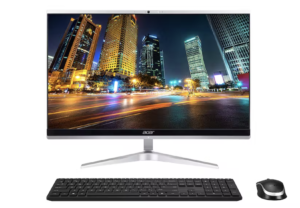
The Acer Aspire desktop is an excellent option for working from home for several reasons:
- Powerful Performance: The Aspire desktop is equipped with a powerful processor that can handle complex tasks such as video editing, graphic design, and multitasking. It has a significant amount of RAM and storage space that allows you to run multiple applications simultaneously.
- Cost-effective: The Acer Aspire desktop is a budget-friendly option, making it an excellent choice for freelancers who need a reliable and high-performance computer without breaking the bank.
- Customizable: The desktop is customizable, allowing you to upgrade its components as per your requirements. This makes it easy to adjust the system to your specific needs.
- Large Display: The Aspire desktop has a large display, making it easy to work for longer durations without straining your eyes. This is especially important for freelancers who spend a significant amount of time in front of a computer.
- Multiple Ports: The Aspire desktop has multiple USB and HDMI ports, making it easy to connect to other devices such as printers, cameras, and external hard drives.
- Pre-installed Applications: The Acer Aspire desktop comes with pre-installed applications such as Microsoft Office, which can save you the hassle and cost of purchasing and installing these programs separately.
Overall, the Acer Aspire desktop is an excellent option for freelancers who need a powerful, customizable, and cost-effective computer that can handle a variety of tasks. Its large display, multiple ports, and pre-installed applications make it an excellent value for money.
Laptops vs. PCs: what’s the best for working from home?
1. Laptop/notebook
One of the biggest perks of working from home is being flexible: this translates into possibly being able to work from anywhere, or to often work at the client’s premises, or even work in different places in your house or office. For these reasons, you must take advantage of portable technology and invest in a laptop or a notebook.
How do you choose the best laptop or notebook for your freelancing business?
Once again, this depends on what type of job you do and what technology you need.
If you’re an IT consultant, you may need a machine capable of handling a lot of data, so your laptop will have to have a lot of RAM and space on the disk. If you’re a writer, you need a functional laptop, able to connect you and that you can use to write and research: you don’t need the last in technology, but you surely need something reliable.
So, evaluate your daily job and check if a laptop would be the best choice.

2. Desktop
A desktop is a perfect computer for freelancers that work almost exclusively from home: it’s not that flexible, but if you pick up a good one, it can be potent. Most of the time, a lot of the components in a desktop can be easily removed, which means you can upgrade it to better suit your needs without spending too much or changing the whole system.
How do you choose the best desktop for your freelancing business?
The ultimate choice is based on what you need a desktop computer for. Generally speaking, you should also go for a desktop with much memory and space in the hard disk. On top of this, do not forget the graphic card if you need to work with visuals, and do not forget about the audio card if you have to work with music.
A desktop computer almost always comes out with a monitor, so make sure you choose one that is big enough to allow you to use it comfortably and capable of holding on to what you do.
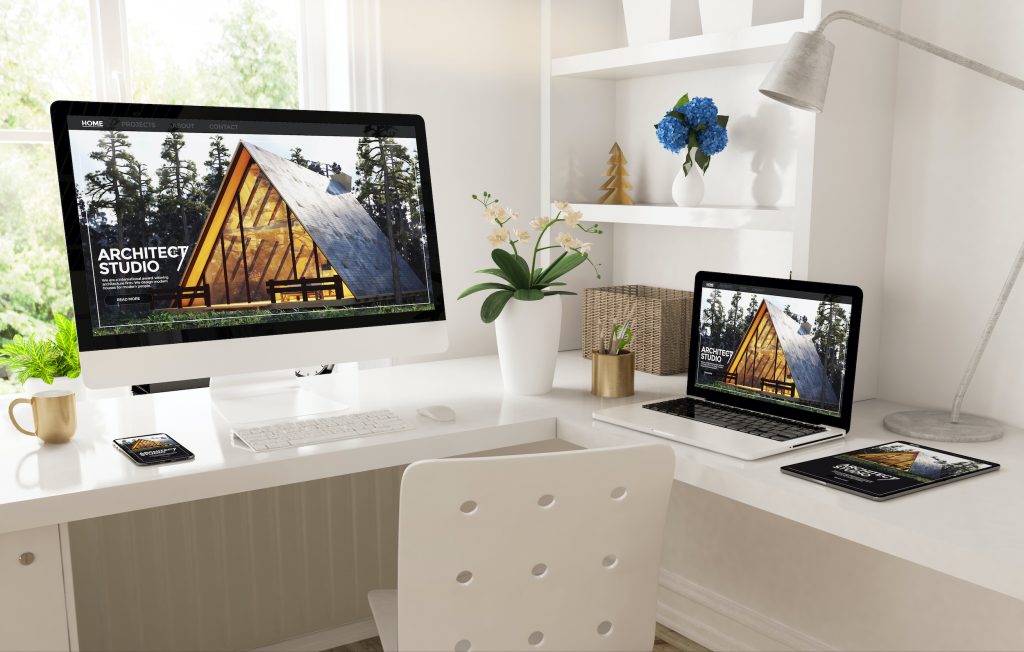
Are desktops cheaper than laptops?
A laptop and a desktop computer can have the same price nowadays. Yes, this is right: the best laptops cost a lot of money because they are usually equipped with fantastic software and, since they are also portable, you have to pay for both of these things.
It’s not unusual to find a laptop that costs more than a desktop and has the worst hardware because companies know that most people will always use a notebook for its flexibility.
Specific desktop computers can cost a lot of money based on the hardware and software they’re equipped with. Overall, you can buy cheap laptops and desktops, but you will most certainly sacrifice quality in both cases.
Desktop vs. Laptop: which one should you choose for working from home?
Based on the above, these are a few things you need to ask yourself before buying one between a laptop and a desktop:
- How portable do I need it to be?
- What balance of power and price do I need?
- How much do I want to spend?
- How do I use the tool?
- What’s the thing that I cannot miss?
- How does it fit with my workspace?
If you can answer these questions, the most significant part of your job is done. If you can’t, you need to narrow down why you would choose one over another.

Laptop or desktop computer: what’s the best for working from home?
We keep saying the same: it depends on you, your business, and your needs. Generally speaking, a laptop is always more advisable unless you really need a powerful machine for your work (e.g., if you do videos!) or you don’t need to use it outside of your home office.
One of the biggest perks of using a laptop daily is that you can still connect it to an external and bigger display. In this way, you’ll benefit from its portability, but at the same time, when you’re working in the office, you won’t sacrifice comfort.
Where to buy a laptop or a desktop computer?
If you are looking to buy a new computer, whether a laptop or a desktop, you have multiple options: you can buy locally in a shop or online.
Generally speaking, unless you have no access to big shops and shopping malls close to your place, you may be subjected to higher prices and a limited choice if you buy in traditional shops. Buying online gives you a chance to avail of better prices and a better selection.
Once again, the choice is based on your needs and your city. If you decide to buy online, we recommend Amazon as your primary choice if you’re looking for a machine. On Amazon, you can find standard and more sophisticated machines. It goes without saying that if you are looking for Apple products, you better shop at the Apple Store because the choice on Amazon may be limited.
This post may contain affiliate links, which means that we may receive a small commission, at no cost to you, if you make a purchase through a link.






